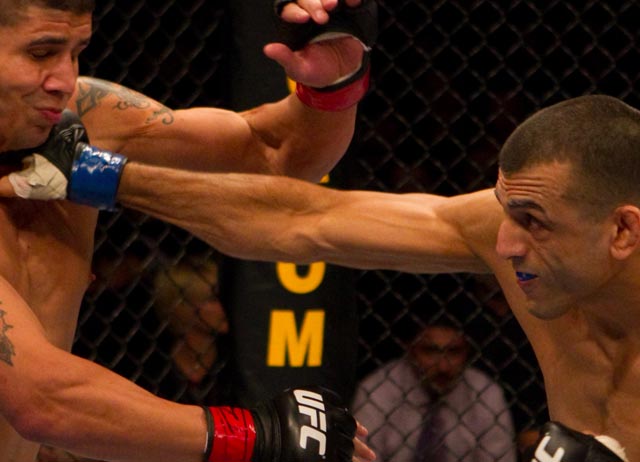
That satisfaction shines through absolutely. Whereas some fighters see training as a necessary evil or, at best, a means to an end, Sotiropoulos relishes the six to eight hours of effort he puts into honing his craft each day. The sentiment is a great credit both to Sotiropoulos passion for mixed martial arts, but also to the trainers with whom he’s been working since last year.
“I really have tremendous coaches,” Sotiropoulos said. “Leonard Gabriel is a tremendous boxing coach and I think he’s going to get a lot of recognition from the fighters he’s training in the years to come. Then I’ve got Eddie Bravo and everybody in MMA knows that guy’s name, and he’s got great philosophies and views and skills for mixed martial arts. Then I’ve also recently added Eric Jetton whose been training me in wrestling. That guy is a tremendous wrestler and he’s a Division I three-time All-American. I’m surrounded by people who are masters of their craft.”
Studying under the masters of each discipline that makes of mixed martial arts has been the philosophy Sotiropoulos has followed throughout his career. Even before he began fighting in MMA professionally, Sotiropoulos felt it important to study each discipline individually in preparation for one day entering the cage. To Sotiropoulos mind, there is no better approach to becoming a fighter of the highest caliber.
“My goal to be an MMA fighter led me to go train in jiu-jitsu, wrestling, and boxing, compete in all those before I ever had my first fight,” Sotiropoulos explained. “I wanted to prepare myself well before I went and did the actual sport of mixed martial arts. Everything is about preparing. You do it right, or otherwise why do it? It’s a waste of time.
“Rather than dilute your talent or skill level, you should go to the individual disciplines and acquire a broad spectrum of skills and get the depth at the same time so you’re getting a lot more for your time and effort.”
This doesn’t necessarily fall in line with the shift toward gyms catering to mixed martial arts training, which off a one-stop shop for all the training needs of the modern MMA fighter. The merits of such training are open for debate, but the philosophy is one that Sotiropoulos feels caters to the lazy would-be fighters of the world.
“You know what really turns people off to that whole concept is the time that it takes,” Sotiropoulos said. “If I told you to go do ten pushups, you’d probably say ‘sure, no problem.’ But if I told you to go do 10,000 pushups, you’d probably say ‘I quit, I’m not going to even try.’ That’s what people probably see. They think ‘ah, I don’t want to go out there and learn jiu-jitsu, I don’t want to go out there and wrestle, I just want to fight. I’ll just go and learn one takedown, one submission, and one punch and then I’ll fight.’ And the thing is, you’ll have no depth in your game. If you do it all and train it all in isolation, you’re going to have the depth and skill and talent. But it takes heart and time is what people don’t want to put in. But that’s just human nature.”
For Sotiropoulos, preparing for a successful career in mixed martial arts is no different than prepare for successful career in any field. Although a financial career, which Sotiropoulos once held, is decidedly different than that of a cage fighter, the education process for both, he explains, has been very similar.
“You go to school and study separate disciplines for everything,” Sotiropoulos said. “You go to school and do mathematics, history, geography, English, so on and so forth. It’s the same with mixed martial arts. You don’t take a test in math and answer history questions. You don’t go to business school and take an exam on history. You’re basically addressing the subject matter. I’m treating it the same in mixed martial arts, and I think that’s the way to go about it.”
Given Sotiropoulos’ success thus far, it’s difficult to argue against his training philosophy.
Comments
George Sotiropoulos Will Fight Anyone